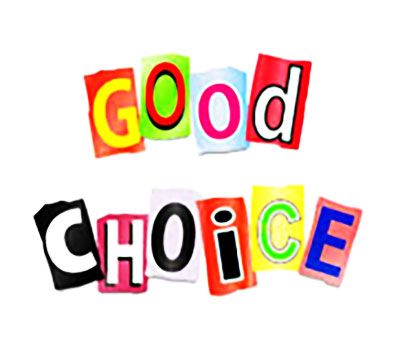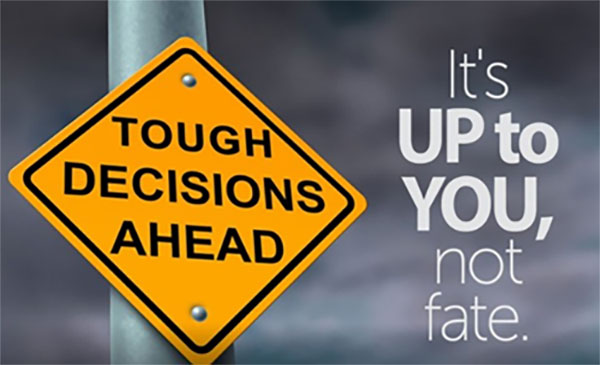HOW TO HELP YOUR KIDS MAKE GOOD DECISIONS THROUGH PARENTAL GUIDANCE
Turning decision making over to your children is a step-by-step activity that is based on their age and maturity. As your children get older, you can increase the importance of the decisions they make and the number of choices they have. Good decision making is complex and it takes years of practice to be good at it. We often hear “I’m tired of fighting with them”.
Kids must understand that parents are in charge. The respect and discipline that results from parental guidance helps kids tremendously. They learn good habits that they will carry into their adult lives. Yes, you want your kids to be happy but guiding them to be the best possible person that they can be means using your experience to make the best decisions for them. Your role is a valuable resource that guides them to success and satisfaction; not merely their immediate gratification.
With each decision, you want your kids to recognize whether their decisions were good or bad and that they’re responsible for the consequences of them. By making this connection, they can see that their decisions are their own. Of course, you should retain the power to over-rule their decision, but you will need to make careful explanation of the reasons that support your choice as the best approach.
Left to their own choices, kids most often will make decisions that are impulsive and deliver them what they want right now. You can help your children by “teaching them to stop and think first.” Kids need guidance and structure. It helps to let them know in advance about plans and activities, so that they are guided toward successful behavior. Of course, you should retain the power to over-rule their impulsive decisions. Remember, it is the immediate need or action that they most often value first. You will need to make careful explanation of the reasons that support your choice as the best approach for now and for later.
In addition to advance planning, guiding kids to stop and ponder several key questions will help them to make better choices and will help you to understand what is motivating their mindset. You can coach your children to learn good decision making. Your guidance will provide them with the ability to make thoughtful choices and development of maturity.
“Why do I want to do this?” – Kids should understand what is motivating their choices. Often times, peer-pressure can force “stupid” decisions. A good sense of consequences and doing the right thing will definitely expand every kid’s ability to make decisions.
“How can this help me?” – It is obvious, but an honest answer about what a kid wants personally, will build their own confidence and self-esteem. Falling prey to peer pressure and outside influences may well cause discontent, depression, and limit the personal growth and potential for a kid. Decisions set direction for goal setting and achievement in life. That means more about personal development than just dreaming about things.
“Will it be worth it?” – Knowing that the path you choose has benefits is important. We have all known the feeling of satisfaction from learning, doing our best, and winning. It is the essence of “play” to compete, personally grow, and gain satisfaction from personal performance.
“What else could I do?”– Kids make bad decisions; that is just part of growing up. However, as parents, coaches, and teachers, we need to assure that is not a continually reoccurring habit. It is our job to hold them responsible for their poor decisions and to understand that there are consequences for every decision and action that we make. The framework of understanding the basics of right and wrong; consequences for actions; immediate and long-term benefits will help them to make good decisions that will benefit them.
“Is this decision in my best interests?” – Understanding what is best in both the short and long term, having these concerns outweigh competing interests from popular culture and peer pressure, and making a decision based on their best interests is the culmination of the decision making process.

Decision making is one of the most important skills your children need to develop to become healthy and mature adults. It is crucial because the decisions your children make dictate the path that their lives take. Assuring they make choices that appeal and benefit them is important. Understanding that bad choices happen and will result in some failures that present consequences is inevitable. These situations will pose more decisions and opportunities to find success and satisfaction.
Kids themselves can easily identify and understand the causes of bad decisions. “I didn’t stop to think.” – “It seemed like fun at the time.” – “I was bored.” – “Peer pressure.” – “I didn’t consider the consequences.” – “To get back at my parents.”
Development of thinking abilities; social skills; emotional skills; physical development; educational experience; technological abilities; and outside influencers (people/peers; safety; language; privacy; drugs; alcohol; hormones, etc.) all have an impact potential on good decision making. During a recent NPR News presentation, Tony Cox offered a segment on “Tell Me More” that explored the passage from childhood to adulthood. He explained that “Most of the privileges and responsibilities of adulthood are legally granted by the age of 18. That’s when you can vote, enlist in the military, move out on your own, but is that the true age of maturity? A growing body of science says no. Critical parts of the brain involved in decision making are not fully developed until years later – at the age of 25 or so.”
When your child says this is too hard or I do not like it, or I don’t want to go; gently remind them that some things are necessary and that life is not always easy or to our liking. Our choices and the consequences that result from them help us to achieve our personal best. Otherwise we can fall behind, get depressed or scared, become unprepared, and without corrective action, will fail.
It is a simple fact that a kid, if given the choice, will choose to be someone special and a winner. Often kids complain because they were not prepared in advance, or are preoccupied and do not want to stop the immediate gratification they are experiencing. They are kids after all and want that success NOW. Providing the framework for kids to understand the choices and benefits of achievement are ours as parents, coaches, and teachers. In the end, our veto of their bad choices and behavior will make them happier and, that will make us happier too.
Acknowledgements: KidsMatter; ParentMap; Psychology Today; NPR News (Tell Me More, Tony Cox)



